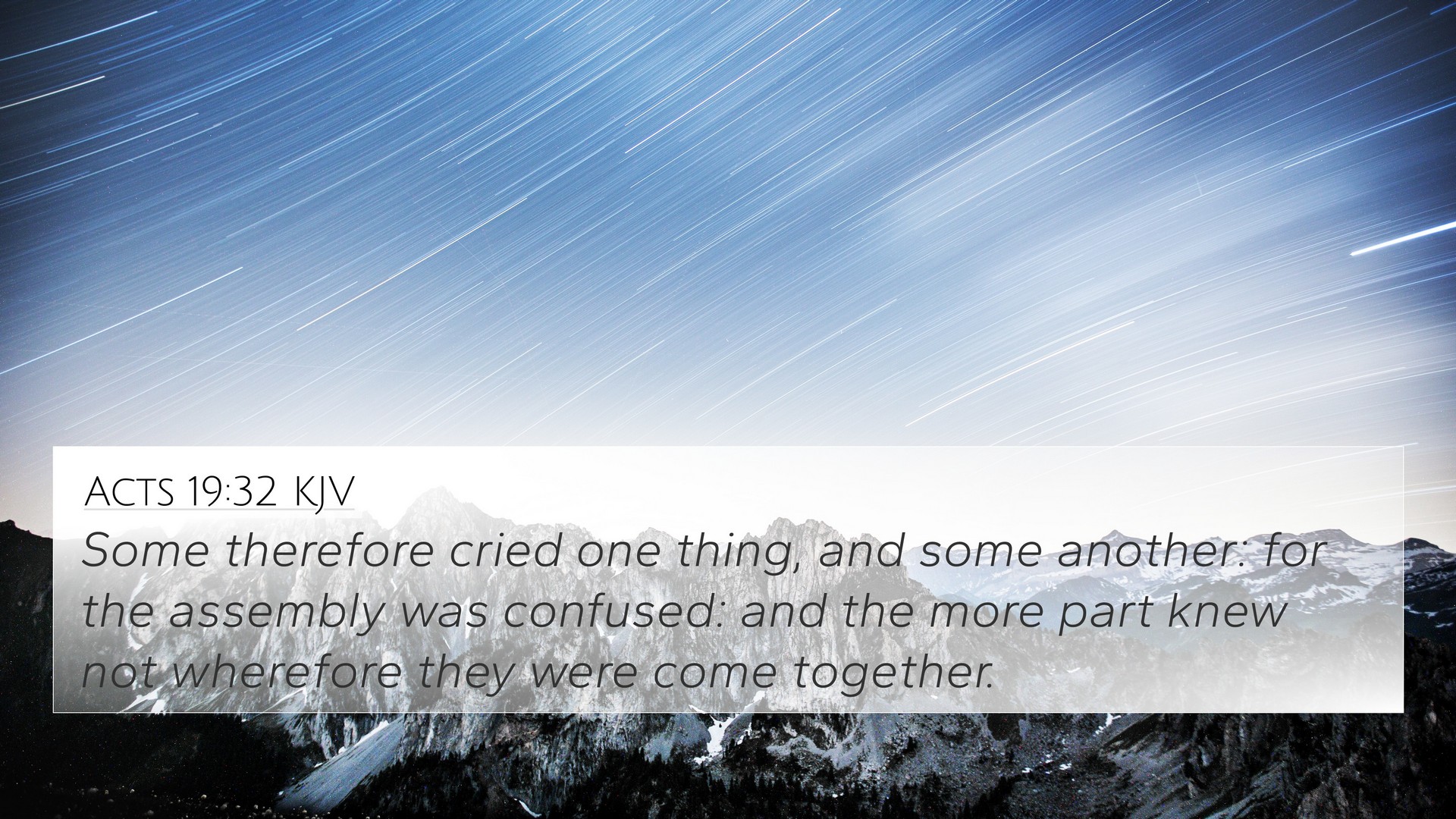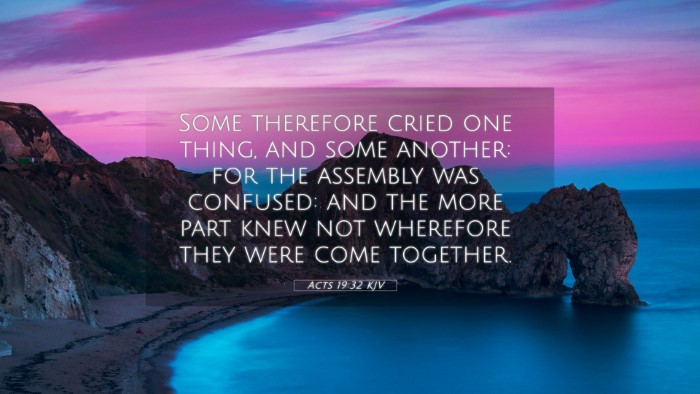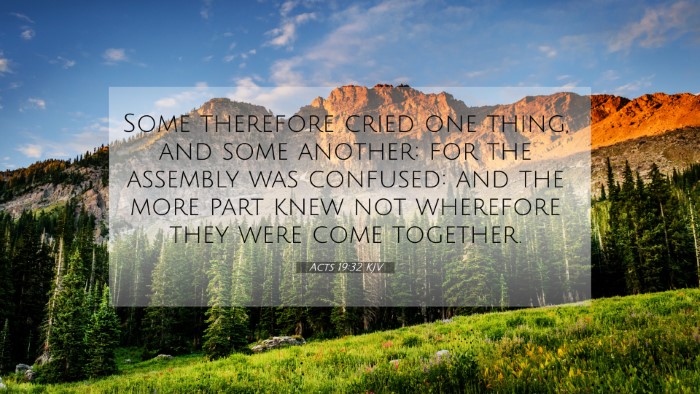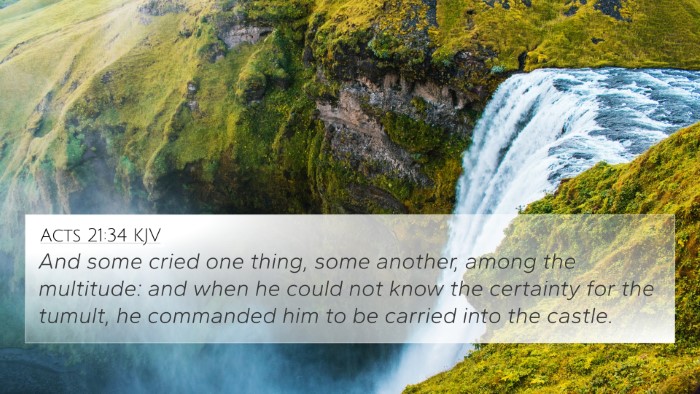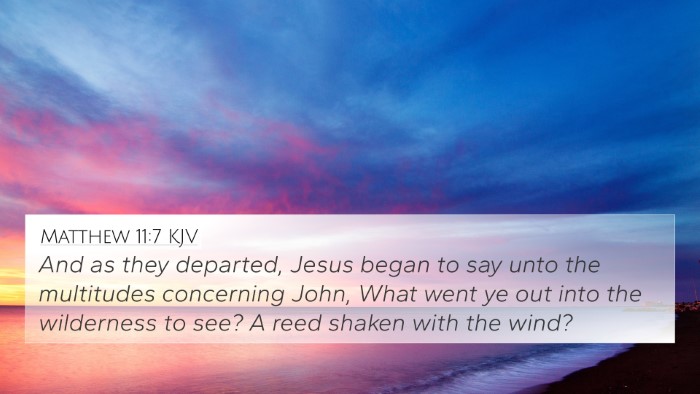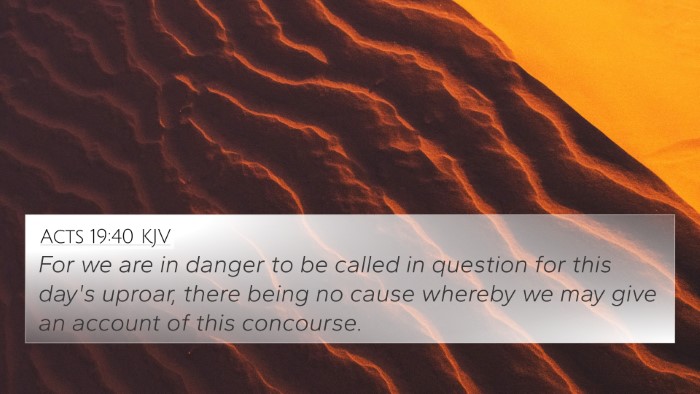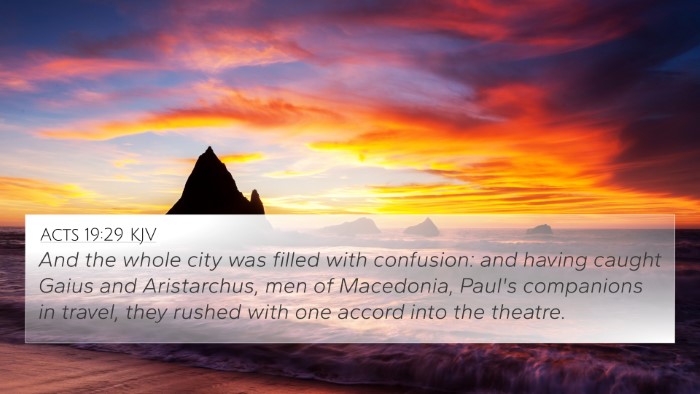Understanding Acts 19:32
Acts 19:32 presents a pivotal moment in the early Christian church and highlights the complex interplay between believers and the surrounding culture. This verse reads:
"Some therefore cried one thing, and some another: for the assembly was confused; and the more part knew not wherefore they were come together."
Verse Context
This verse occurs within the narrative of Paul's ministry in Ephesus, where a riot sparked by the silversmith Demetrius disrupted the local economy and drew a mixed crowd into confusion. Understanding this context is crucial for proper interpretation and application.
Commentary Summaries
-
Matthew Henry:
Henry emphasizes the chaos and disorder among the assembly, pointing out that the loud and conflicting shouts of the people indicate a lack of unity and understanding regarding their grievances. He notes that such confusion can stem from the influence of a few instigators, which leads many to join a cause without fully grasping its significance.
-
Albert Barnes:
Barnes suggests that this passage illustrates human nature in tumultuous situations; people often lose sight of reason and act impulsively. The disorganization within the crowd symbolizes the challenges faced by early Christians as they navigated opposition. Barnes draws parallels to modern instances where mobs can form in a frenzy, lacking clear direction.
-
Adam Clarke:
Clarke focuses on the multiplicity of voices in the crowd, which reveals the diversity of opinions present even when a singular cause brings them together. He draws out the point that effective communication is essential in any movement or assembly and that without it, confusion reigns. Clarke also highlights the potential dangers of following a crowd blindly.
Bible Verse Cross-References
This verse can be linked to several other scriptures to enrich understanding. Here are some relevant cross-references:
- 1 Corinthians 14:33: "For God is not the author of confusion, but of peace, as in all churches of the saints." - This verse underlines the contrast between divine order and human chaos.
- Acts 17:5: "But the Jews which believed not, moved with envy, took unto them certain lewd fellows of the baser sort, and gathered a company, and set all the city on an uproar..." - This connects to the theme of inciting unrest.
- Philippians 1:27: "Only let your conversation be as it becometh the gospel of Christ..." - This encourages unity in purpose among believers, contrasting with the confusion in Ephesus.
- Matthew 12:25: "And Jesus knew their thoughts, and said unto them, Every kingdom divided against itself is brought to desolation..." - This illustrates the consequences of division and discord.
- John 10:12: "But he that is an hireling, and not the shepherd, whose own the sheep are not, seeth the wolf coming, and leaveth the sheep, and fleeth..." - Relating to the idea of leadership and responsibility during chaotic times.
- James 1:8: "A double minded man is unstable in all his ways." - This verse complements the theme of confusion and inconsistency in thought and action.
- Proverbs 29:18: "Where there is no vision, the people perish: but he that keepeth the law, happy is he." - Highlighting the need for clear direction to avoid disorder.
Thematic Connections
The confusion in Acts 19:32 illustrates broader themes present throughout the Scriptures:
-
Human Instability:
Many passages reflect the fickleness of human emotions and actions, demonstrating that without guidance from God, people tend to Chaos.
-
The Role of Leadership:
Throughout the Bible, effective leadership is highlighted as essential for guiding groups and maintaining order, as seen in the actions of Moses and Paul.
-
Unity in the Body of Christ:
Passages like 1 Corinthians 12 emphasize the importance of unity and the dangers of division that arise from misunderstandings.
Comparative Analysis of Acts 19:32
This verse serves as a focal point for examining the early church's challenges and responses to conflict:
- In comparing Acts 19:32 with similar situations in the Gospels, we see recurring themes of public unrest and the necessity of strong, purposeful communication.
- The dynamics of protests and civil unrest illustrated in today’s society mirror the chaos faced by early Christians, raising questions about unity, purpose, and the impact of external pressures.
- Reflecting on the Apostle Paul's teachings, one can ascertain how confusion often leads to opportunities for testimony and witness, an idea elaborated upon in the epistles he authored.
Conclusion
Acts 19:32 captures a moment of tumult in the early church, inviting readers to explore the significance of unity, purposeful engagement, and the nature of human responses to conflict. By examining this verse with cross-referencing Bible texts, we deepen our understanding of not only the historical context but also the timeless lessons it conveys for contemporary believers.
